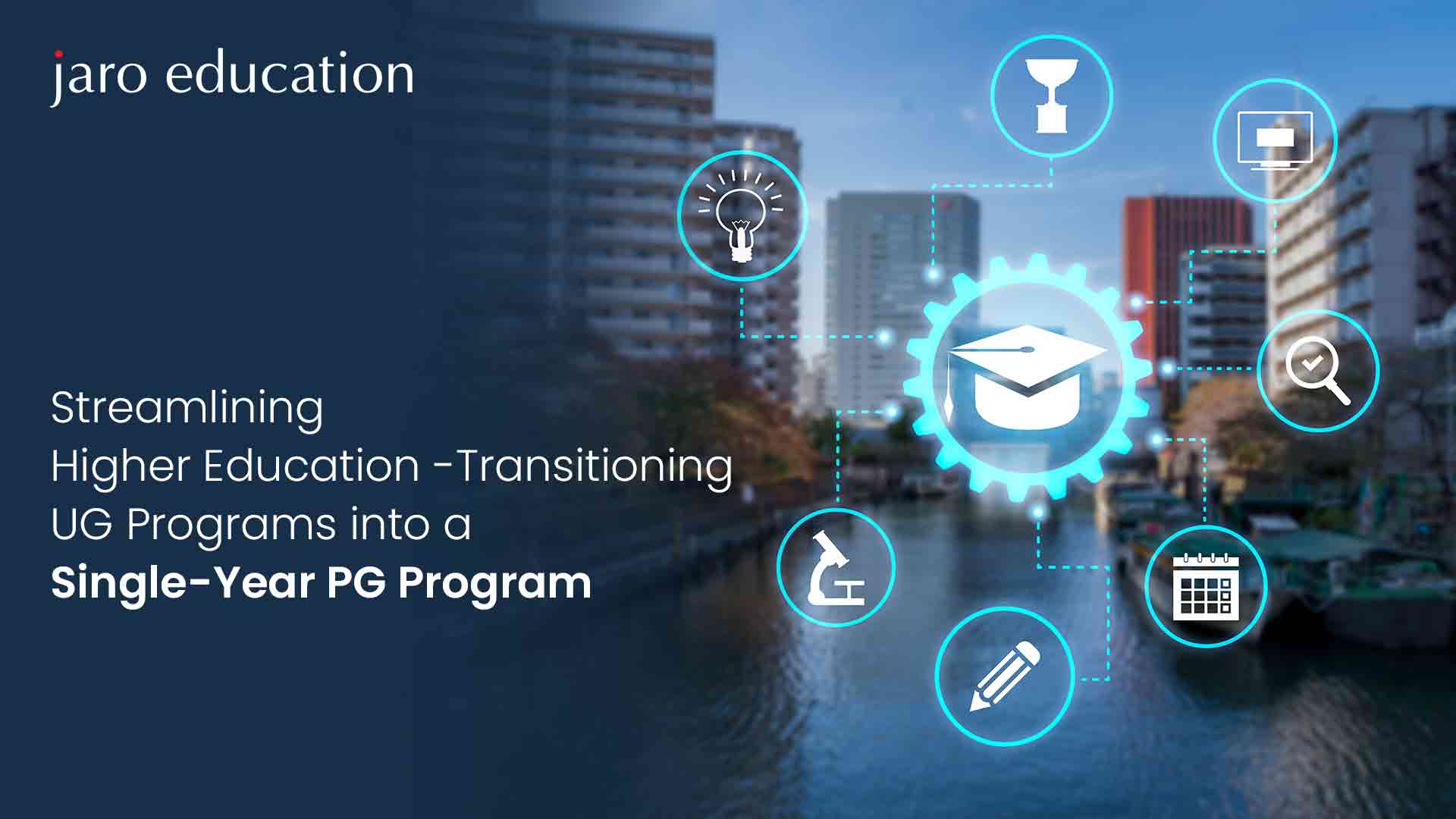
- jaro education
- 23, January 2024
- 1:10 pm
In a recent stride towards standardization and the establishment of an open platform for the parallel comparison of educational qualifications in Higher Education Institutions (HEIs), the University Grants Commission (UGC) has introduced the National Higher Education Qualifications Framework (NHEQF). This strategic decision aims to address the historical challenges faced by students in post-graduate courses and UG courses due to the absence of a standardized system for comparing diverse qualifications on both national and international levels.
The NHEQF serves as a comprehensive mechanism to identify and categorize higher education qualifications seamlessly across levels 5 to 10. Levels 1 to 4 are exclusively designated for school education, regulated by the National Skills Qualifications Framework (NSQF). Each level within the NHEQF is meticulously defined by specific attributes based on learning outcomes, outlining what learners are expected to acquire or demonstrate upon successful completion of each level.
Understanding the NHEQF Levels
The NHEQF unfolds as a robust framework, offering students the opportunity to pursue diverse fields of study, aligned with a set of performance criteria crafted in coordination with both national and international standards. Let’s delve into the intricacies of each of the five levels of qualifications under the NHEQF:
Level 5: Undergraduate Certificate
Level 5 marks the completion of the first year, encompassing the initial two semesters of an undergraduate program. Successful students are awarded an Undergraduate Certificate, recognizing their foundational achievements in higher education.
Level 6: Undergraduate Diploma
Table of Contents
Moving forward, Level 6 acknowledges the completion of the first two years, translating to the first four semesters of an undergraduate program. Students who successfully meet the requirements are conferred with an Undergraduate Diploma, signifying a more in-depth understanding of their chosen field of study.
Level 7: Bachelor’s Degree
Level 7 encapsulates the first three years, equivalent to the initial six semesters, of a four-year undergraduate program. Upon successful completion, students are awarded a Bachelor’s Degree, a testament to their comprehensive understanding and proficiency in their chosen discipline.
Level 8: Bachelor’s Degree with Honours/Research Specialisation and Postgraduate Diploma
Expanding further, Level 8 spans four years, encompassing eight semesters of a Bachelor’s Degree. Graduates at this level have the option to choose an Honours or Research specialization, providing a nuanced focus on their academic pursuits. Additionally, Level 8 includes one year, i.e., two semesters of a 2-year Master’s program, offering students the opportunity to obtain a postgraduate diploma.
Level 9: Postgraduate programme
Level 9 extends to postgraduate program students who have completed two years, i.e., four semesters of studies after obtaining a Bachelor’s Degree. Furthermore, it offers a Master’s Degree to students who complete one year, i.e., two semesters of studies after obtaining a Bachelor’s Degree with Honours/Research. This level represents a higher echelon of academic achievement and specialization.
Level 10: Doctoral Degree/PhD
At the pinnacle of the NHEQF, Level 10 is the zenith where a Doctoral Degree or PhD is awarded to students who successfully complete this advanced level of study. It signifies the highest level of academic achievement and represents a culmination of rigorous research and expertise in a specific field.
Structural Overview
The restructuring of postgraduate studies presents a diverse framework featuring three key formats: a one-year master’s program, a conventional two-year master’s program, and a pioneering five-year integrated bachelor’s and master’s program. This structural diversity offers students the autonomy to select a path tailored to their academic and professional aspirations. By providing these distinct trajectories, the educational landscape becomes more adaptable, catering to individual preferences and aligning with the diverse goals of students. This strategic approach not only condenses the traditional timelines but also enhances the educational experience by accommodating varying learning preferences and allowing for a comprehensive exploration of academic pursuits.
Alignment with NEP 2020
The alignment with the National Education Policy (NEP) 2020 was pivotal in initiating the restructuring of undergraduate degrees, laying the foundation for subsequent changes. The NEP permitted the flexibility of three or four-year undergraduate programs, offering certifications including UG certificates, diplomas, and bachelor’s degrees. The UGC’s endorsement of the four-year bachelor’s program highlighted its efficacy in delivering multidisciplinary education while emphasizing a targeted focus on majors and minors. This harmonization with the NEP underscores a strategic commitment to aligning higher education with contemporary educational paradigms, fostering versatility and depth in academic pursuits. The restructuring echoes the NEP’s vision of a dynamic and adaptive education system that caters to the evolving needs of students and the workforce.
Fluidity in Disciplinary Transitions
The UGC’s latest curriculum facilitates a smooth shift between disciplines at the postgraduate (PG) level, fostering fluidity in academic transitions. This seamless progression is enabled through national or university-level entrance examinations, eliminating constraints tied to a student’s undergraduate (UG) major or minor. Regardless of their UG specialization, students gain the flexibility to pursue master’s programs in their chosen discipline. The emphasis on entrance examinations ensures a fair and merit-based admission process, promoting inclusivity and allowing learners to explore diverse academic paths. This initiative not only accommodates individual preferences but also aligns with the UGC’s commitment to providing students with a comprehensive and adaptable educational experience.
Curriculum and Credit Framework
Central to the restructuring is the “Curriculum and Credit Framework,” which delineates the minimum credit prerequisites for various postgraduate (PG) degrees. This framework is in harmony with the National Higher Education Qualifications Framework (NHEQF), augmenting the transferability of educational credentials between institutions. By establishing a standardized system that aligns with national qualifications, the Curriculum and Credit Framework enhances the portability of academic achievements, allowing students to seamlessly carry their educational credentials across different educational settings. This not only streamlines the assessment and recognition of academic accomplishments but also promotes a more uniform and coherent approach to evaluating the academic proficiency of students in the context of postgraduate education.
Flexibility in Learning Modes
Aligned with the ethos of flexibility outlined in the National Education Policy (NEP) 2020, the curriculum embraces various learning modes. It accommodates offline, open and distance learning (ODL), online learning, and hybrid options. This adaptability caters to diverse learning preferences and individual circumstances, acknowledging the varied needs and preferences of students. The curriculum’s commitment to offering a range of learning modalities reflects a progressive approach to education, ensuring accessibility and inclusivity in the learning experience. Students can choose the mode that best suits their learning style, promoting a more personalized and effective educational journey in accordance with the principles laid out in the NEP 2020.
Permits to Pursue Dual Programs
The restructuring provides students with the flexibility to concurrently pursue two academic programs. Whether opting for the traditional physical mode or a combination of physical and open and distance learning (ODL)/online modes, this provision aligns seamlessly with the ethos of adaptability championed by the National Education Policy (NEP) 2020. This progressive approach recognizes the diverse circumstances and preferences of students, allowing them to customize their educational experiences. By supporting the simultaneous pursuit of multiple programmes, the restructuring embraces the NEP’s commitment to providing learners with a dynamic and individualized educational journey that accommodates diverse learning needs and aspirations.
Embracing Online Education
Acknowledging the evolving nature of work and the growing significance of online education, the guidelines permit students to engage in postgraduate programs exclusively through online platforms. This recognition is a response to the diverse circumstances and commitments of today’s learners, promoting inclusivity by providing a flexible and accessible mode of education. By embracing the option for entirely online postgraduate programmes, these guidelines align with the changing dynamics of the contemporary learning landscape and cater to the needs of a broad spectrum of students, facilitating their academic pursuits irrespective of geographical constraints or other commitments.
Incorporating Work Experience Credits
The guidelines propose the inclusion of work experience credits at the postgraduate (PG) level, acknowledging the significance of experiential learning. This innovative approach introduces a dynamic element, allowing for adjustments to the program duration based on the accrued work experience. By aligning education with real-world demands, this initiative recognizes the practical value of hands-on experience and seeks to integrate it into the academic realm. The inclusion of work experience credits not only enriches the learning experience but also underscores a forward-thinking perspective that values the synergy between academic knowledge and practical application in preparing students for the complexities of their chosen fields.
Five-Year Integrated Program
The envisioned five-year integrated programme, amalgamating bachelor’s and master’s degrees presents a holistic approach to education. This extended duration facilitates in-depth exploration and cultivates a comprehensive understanding of chosen subjects. By seamlessly combining undergraduate and postgraduate studies, this program offers students an immersive educational experience, allowing them to delve deeply into their chosen fields of study. The extended timeframe not only promotes a thorough grasp of subjects but also encourages a holistic and nuanced perspective, preparing students with a well-rounded education that goes beyond the confines of a traditional academic structure.
Conclusion
The transition of UG programs into a single-year PG format, as outlined by the UGC, represents a forward-thinking approach to higher education. This restructuring not only condenses the traditional learning pathway but also introduces flexibility, adaptability, and responsiveness to the evolving needs of students and industries. The alignment with the NEP 2020, emphasis on multidisciplinarity, integration of online learning, and recognition of work experience credits collectively contribute to a dynamic and future-ready education system. As this innovative framework takes effect, it has the potential to shape a generation of learners equipped not only with academic proficiency but also with the resilience and versatility needed to thrive in a rapidly changing global landscape.
Jaro Education stands out as a guiding light, helping navigate through pioneering and accredited programs in this era of evolving education. It guarantees a smooth and fulfilling educational experience, addressing the dynamic changes in learning.
So, embrace the forthcoming era of education with Jaro Education – your ally in achieving academic brilliance and career triumph. With a commitment to innovation and accreditation, Jaro Education is dedicated to shaping a transformative educational journey for students, ensuring they are well-prepared for the challenges and opportunities of the future. Partner with Jaro Education and embark on a path to academic excellence and professional success.









